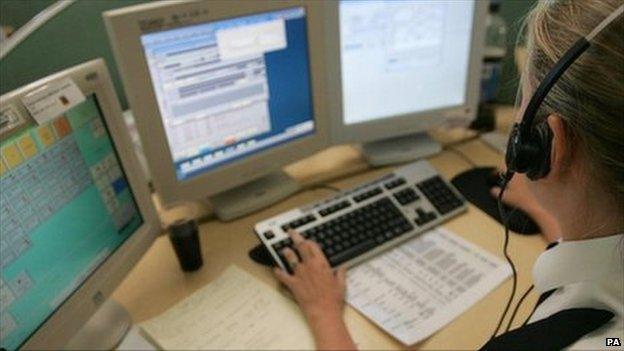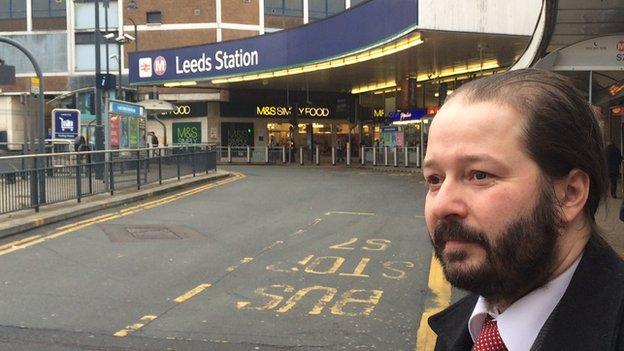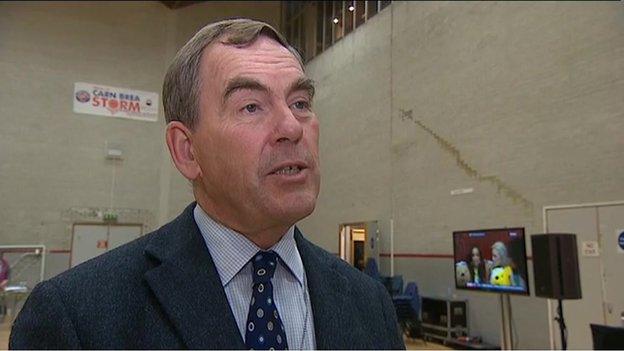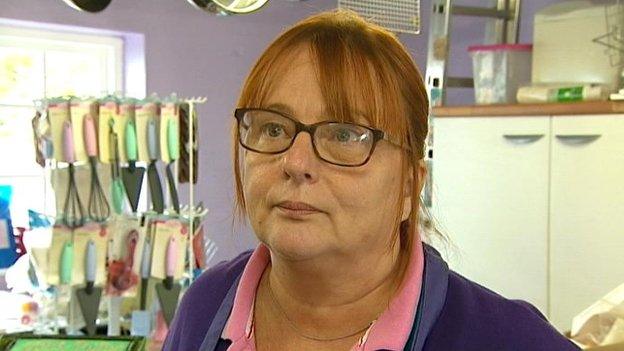A million non-emergency 101 calls abandoned
- Published

More than a million callers who tried to get through to the police 101 non-emergency phone service in the past year were cut off or decided to abandon their efforts, the BBC has found.
The number of dropped calls rose by more than 200,000 in the 12 months to September, despite a fall in the overall number of people dialling 101.
Some police forces had examples of callers kept waiting more than an hour.
The government said it was working with forces to improve the service.
The BBC used the Freedom of Information (FOI) Act to request data from all 46 police forces across the UK, including the British Transport Police.
West Yorkshire Police was one of six forces that failed to provide any data.
Sam Clayton, from Bradford, said he made several lengthy but unsuccessful attempts to contact West Yorkshire Police on 101 when he saw people stealing metal from his neighbour's garden.
"I'd spent just over 60 minutes on hold. Then the call seemed to be answered, but then I was cut off," he said.
Mr Clayton said he also tried to use contact forms on the force website, but these also did not work.

Sam Clayton says he was kept on hold for an hour before being cut off
"It's extreme frustration really," he said, "I spent so long on hold, so long trying to use various websites to contact them. It just leaves me wondering how many people are the victims of crime in that area who just give in."
Devon and Cornwall Police call handler Liz Taylor told the BBC: "We want to do the best for our callers and we don't want to see them in a long queue. You know as soon as they do get through to us the likelihood is that they are going to be frustrated and cross, which they'll often take out on us.
"We understand their frustration... We just have to apologise as best we can."
Responses were received from 40 forces, providing figures for the past two years from October 2012 to the end of September 2014. Some were able to provide more information than others.
The FOI request revealed that from October 2013 to September 2014 there were 1.07 million dropped or abandoned calls to the 33 forces providing such data. This was a rise of more than 26% on the previous 12 months, even though there were 113,640 fewer calls.
The figures also showed few forces were achieving their own internal targets of answering 90% of calls within 30 seconds.
By this measure, the poorest-performing force was Surrey Police, where 66.8% of calls were answered within 30 seconds, and the best-performing force was Merseyside Police, which answered 97% of calls within 30 seconds.

Dropped 101 calls
848,320 dropped or abandoned calls from October 2012-September 2013
1,071,939 dropped or abandoned calls from October 2013-September 2014
An increase of 26.3%
Based on data from 33 UK police forces

Lancashire Police was shown to have kept a person waiting one hour 18 minutes, and a caller to Greater Manchester Police waited one hour nine minutes.
The Home Office said it published performance data on 101 call-handling on the Police.UK, external website, but there were no national standards.
Police Minister Mike Penning told the BBC: "Police forces are responsible for ensuring 101 calls are answered within their local service standards. We are working with forces to support them to identify where improvements can be made."
However, there are also questions about how reliable the police performance data is.
An inquiry last month by the Devon and Cornwall police and crime commissioner, Tony Hogg, branded the service in his area "completely unacceptable" because most callers were waiting for between 10 and 20 minutes before speaking to an operator.
This is even though police performance data provided to the BBC showed 93% of calls were answered within 30 seconds. The force operates a "triage" system where calls are answered quickly by a switchboard, but callers are kept waiting for a control room operator. It is unclear how many other forces operate a similar system.
"Their figures look very good at first," said Mr Hogg. "But... they're only measuring a small part of the caller's journey, not the system overall.
"Most people are calling because they want to give some intelligence to the police, but how frustrating it must be not to be able to do that easily."
The 101 service is often people's first point of contact with the police, and while sometimes calls can seem of minor importance they could potentially escalate into something more serious.
The BBC spent about two hours in the control room at Devon and Cornwall Police.
In between taking calls about faulty traffic lights and vehicle accidents, call handler Liz Taylor took a call from a school about three children from one family who had failed to turn up.
Under questioning it emerged there was concern about their mother, who was a drug user, and a former partner who had recently returned to the home. Ms Taylor arranged for police officers to make an urgent visit to the family to check on the welfare of the children. They were later found to be safe.

Tony Hogg, Devon and Cornwall police and crime commissioner, has said the service in his area is "completely unacceptable"
Devon and Cornwall Police said it had invested in a new IT system for handling 101 calls to be phased in over the next two years. The force also hired more call handlers, with 23 new staff due to start this month.
Sandy Brooks, head of call management at the force, agreed the service needed to improve.
"It is not where we want it to be, and it's not where it was in the past, but we are rectifying that to make sure it is so in the future.
"We would like to operate a system where the call is only answered once, so the caller does not have to repeat themselves about what the nature of their call is, and we are moving towards that process."
Hear Andrew Bomford's full report on BBC Radio 4's The World at One, Friday at 13:00 GMT.
- Published22 November 2014
.jpg)
- Published20 November 2014

- Published23 October 2014

- Published8 March 2013
